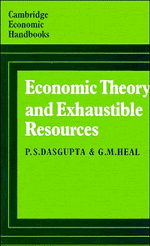Book contents
- Frontmatter
- PREFACE
- Contents
- Chapter 1 A PREVIEW
- Chapter 2 RESOURCE ALLOCATION IN A TIMELESS WORLD
- Chapter 3 EXTERNALITIES
- Chapter 4 INTERTEMPORAL EQUILIBRIUM
- Chapter 5 RENEWABLE RESOURCES: SOME ECOLOGICAL AND ENVIRONMENTAL MODELS
- Chapter 6 EXHAUSTIBLE RESOURCES: AN INTRODUCTION
- Chapter 7 PRODUCTION WITH EXHAUSTIBLE RESOURCES
- Chapter 8 RESOURCE DEPLETION AND CAPITAL ACCUMULATION IN A COMPETITIVE ECONOMY
- Chapter 9 MEASURABILITY, COMPARABILITY AND THE AGGREGATION OF INTERGENERATIONAL WELFARES
- Chapter 10 THE OPTIMAL DEPLETION OF EXHAUSTIBLE RESOURCES
- Chapter 11 IMPERFECT COMPETITION AND EXHAUSTIBLE RESOURCES
- Chapter 12 TAXATION OF EXHAUSTIBLE RESOURCES
- Chapter 13 UNCERTAINTY, INFORMATION AND THE ALLOCATION OF RISK
- Chapter 14 UNCERTAINTY AND THE ALLOCATION OF RESOURCES
- Chapter 15 PRICE MOVEMENTS IN RESOURCE MARKETS
- Chapter 16 CONCLUSIONS
- BIBLIOGRAPHY
- INDEX
Chapter 4 - INTERTEMPORAL EQUILIBRIUM
Published online by Cambridge University Press: 04 April 2011
- Frontmatter
- PREFACE
- Contents
- Chapter 1 A PREVIEW
- Chapter 2 RESOURCE ALLOCATION IN A TIMELESS WORLD
- Chapter 3 EXTERNALITIES
- Chapter 4 INTERTEMPORAL EQUILIBRIUM
- Chapter 5 RENEWABLE RESOURCES: SOME ECOLOGICAL AND ENVIRONMENTAL MODELS
- Chapter 6 EXHAUSTIBLE RESOURCES: AN INTRODUCTION
- Chapter 7 PRODUCTION WITH EXHAUSTIBLE RESOURCES
- Chapter 8 RESOURCE DEPLETION AND CAPITAL ACCUMULATION IN A COMPETITIVE ECONOMY
- Chapter 9 MEASURABILITY, COMPARABILITY AND THE AGGREGATION OF INTERGENERATIONAL WELFARES
- Chapter 10 THE OPTIMAL DEPLETION OF EXHAUSTIBLE RESOURCES
- Chapter 11 IMPERFECT COMPETITION AND EXHAUSTIBLE RESOURCES
- Chapter 12 TAXATION OF EXHAUSTIBLE RESOURCES
- Chapter 13 UNCERTAINTY, INFORMATION AND THE ALLOCATION OF RISK
- Chapter 14 UNCERTAINTY AND THE ALLOCATION OF RESOURCES
- Chapter 15 PRICE MOVEMENTS IN RESOURCE MARKETS
- Chapter 16 CONCLUSIONS
- BIBLIOGRAPHY
- INDEX
Summary
A Basic Result
It is clear that in developing the economics of exhaustible resources time must be brought explicitly into the construction. It is equally clear that the problems concern the allocation of a fixed stock of a commodity, perhaps unknown in size, between competing uses at different dates. In developing the theory it is as well to discuss the simplest considerations first. We shall add complications as we go along.
Assume for the moment that time is discrete. In what follows we shall always regard the ‘present’ instant as t = 0. Since the past is past, choice affects the present and future only. Given this, we can without loss of generality consider the case where time assumes the non-negative integer values, t = 0, 1, 2, … Imagine, to begin with, an individual concerned simply with three instants of time, t = 0, 1, 2. Imagine also that there is a single commodity whose stock at t = 0 is known by him to be S0. The commodity does not deteriorate over time (unlike ice-cream on a hot day). Nor does it grow (unlike forest resources). Nor indeed does it provide a constant flow of service over the three dates (unlike land). In fact, assume that there is no production in this world. But assume that storage is possible costlessly. In effect the commodity is much like a non-deteriorating piece of cake, or a quantity of hard-tack.
- Type
- Chapter
- Information
- Economic Theory and Exhaustible Resources , pp. 95 - 112Publisher: Cambridge University PressPrint publication year: 1980



